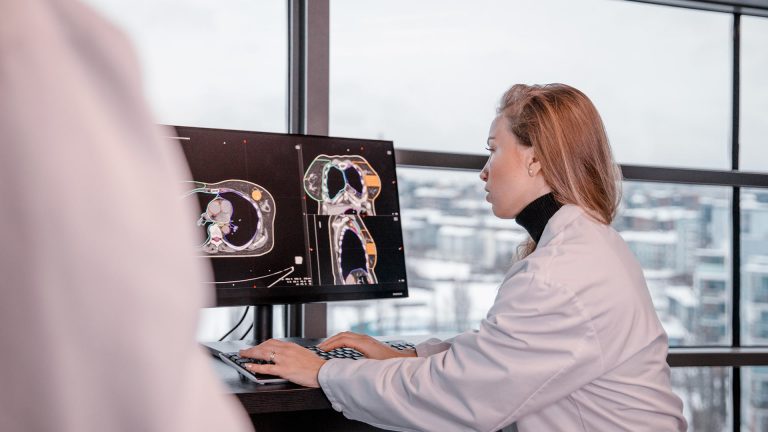This week, we’re focusing on high-impact research presented during the German Society of Radiation Oncology (DEGRO) Annual Meeting. Five posters included a focus on MVision’s guideline-based segmentation, GBS™, solution (also available as an on-premise solution).
Development of an AI-based auto-contouring of upper and lower jaw segments for optimized radiation planning and prosthetic rehabilitation of patients with head and neck tumors.
MVision developed the first jaw model in collaboration with Charité, then researchers at Charité assessed the effectiveness of MVision’s Jaw Model. The researchers found that the jawbone model is precise, time-efficient and shows good results in CTs with and without metal artifacts. The new model represents a practical and economical possibility for radiation oncologists, and oral and maxillofacial surgeons to partially reduce the radiation dose in implant-relevant jaw segments. Furthermore, segmentation of the upper and lower jaw segments can help with the dose distribution optimization and therefore help with planning the prosthetic rehabilitation.
Establishment of an AI-based contouring of cardiac substructures in the adjuvant radiotherapy of breast cancer
Compared to manually created contours of the cardiac substructures, the contours generated using MVision’s GBS™ AI algorithm result in larger volumes. The structures of the RV and LV (right and left ventricle) created manually or using the AI algorithm do not differ significantly with regard to the absolute volume; the DICE score indicates a high degree of structural agreement, especially for the LV with a value >0.85.
Researchers at Charité Berlin found that MVision’s AI-based auto-contouring algorithm for cardiac substructures enables a time-effective creation of contours for RV, LV, RA and LA in the context of thoracic radiation planning. The use of the algorithm facilitates (in the sense of making it easier) retrospective and prospective analysis of the dose absorbed in the cardiac substructures in the context of thoracic radiation therapy and enables user-independent, automated contour creation.
The possibility of AI-based segmentation for automatic target volume determination in adjuvant radiotherapy of breast cancer
The UKE Hamburg and Charité Berlin research team explored the effectiveness of MVision’s Al-based contours for breast cancer. Among the results, the team found that MVision’s GBS™ show great similarity to the original medical contours in both the mean total volume and the DICE. No significant difference in the total volume could be determined. The DICE of CTV/PTV was approximately 0.9 (=90%), with larger breast volumes yielding slightly higher DICE. The data indicate that auto-contouring can already be used for Breast CTV definition in the context of adjuvant breast radiation.
The opportunity of AI-based contours for automatic target volume determination in the irradiation of localized prostate carcinoma
To answer the question if auto-contouring of whole organs such as the prostate can replace manual contouring, a clinical study on the planning CTs of 28 already radiated patients was conducted with the help of the MVision software. The auto-contour was defined as GTV and compared to CTV and PTV. The AI-based target volumes showed a great resemblance to the original target volumes. The DICE coefficients rose with increasing size of volumes. Despite the small sample size of 28 patients, good results could be achieved with a similarity of 84% in GTV, 86% in CTV and 88% in PTV. AI-based auto-contouring showed good results and provides a promising and time-saving approach to target volume for radiation of localized prostate cancers.
Auto-contouring of cardiac structures at risk: volume and dose coverage of the RIVA in thoracic irradiations
MVision’s AI-based contouring was found to lead to more accurate and more reproducible contouring of organs-at-risk. In the case of RIVA (A_LAD, Left Anterior Descending Artery) auto-contouring, it results in larger contour depictions with implications for dose distribution and potential target volume coverage in breast cancer treatment planning. This can help to avoid late cardiac toxicity.
The Leading Guideline-Based Segmentation, GBS™, Solution
Amongst the models discussed in this article, MVision’s Heart and Jaw Model were developed in collaboration with renowned clinicians and clinics, including Charité Berlin. Contact us for further information.

MVision’s GBS™ SaaS Solution
MVision AI is the pioneer of guideline-based segmentation, GBS™, radiotherapy software. Our deep learning system helps you automate contouring, including lymph node levels, to streamline your cancer treatment planning. Our software complies with HIPAA, and GDPR, bringing quality radiotherapy planning to your oncology department.
Book a demo to explore GBS™ for your clinic.
MVision AI is active on LinkedIn, Twitter, Facebook, and Instagram. Follow us on social media and subscribe to our newsletter to stay up-to-date on the latest MVision AI news.
Are you eager to learn more? We welcome you to contact MVision AI:
c/o Terkko Health Hub, Haartmaninkatu 4, 00290 Helsinki, Finland.
Tel: +358 (0) 40 5489 229
Email: info@mvision.ai
For media inquiries:
+358 40 500 7915; pr@mvision.ai







